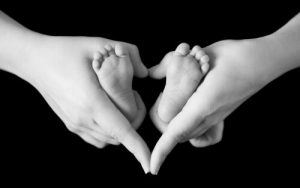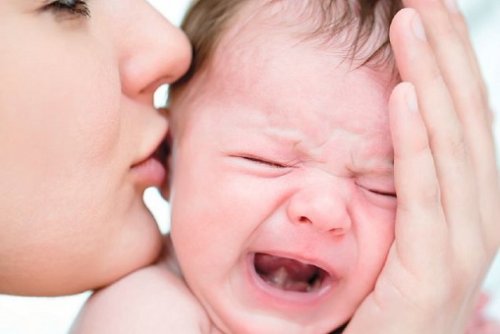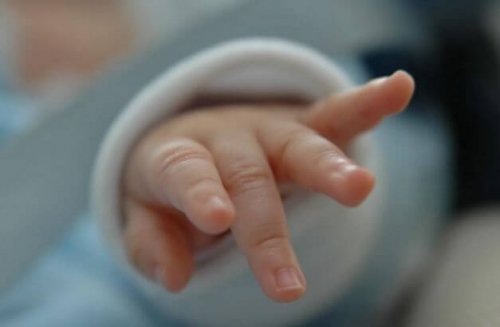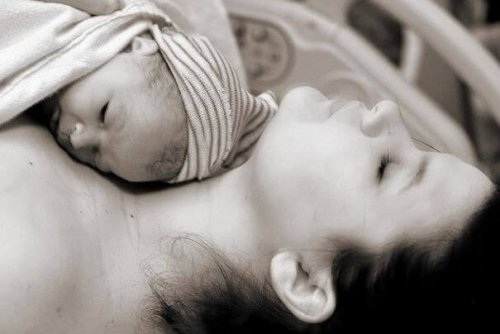Emotional Support in the Postpartum Period

The 40 days after birth are known as the postpartum period, or puerperium. This is a stage of adjustment and adaptation to our new physical and psychological reality.
Although today we do things differently, in many traditional societies women cared for children communally and looked after postpartum mothers. Meanwhile, the men were in charge of finding food.
However, our social environment today is very different. Many of us live far away from our close relatives, who cannot support us. As a result, it is difficult for parents to get help nowadays.
But just because modern society doesn’t allow us to maintain this support network doesn’t mean we don’t need it. In fact, women need social support in the postpartum period to face the physical and emotional wounds of childbirth.

Get support in the postpartum period for a happy family
We must take into account that after giving birth, we need to recover and rebuild our social, biological and psychological structures. Beginning life as mother and baby means living with the most absolute chaos, and often going a little crazy.
In the postpartum period, every new sensation is startling for the new mom. She does not always feel happy, and is not always thrilled about breastfeeding her child at 5 in the morning.
For this reason, now more than ever, the mother needs the emotional support of those who love her. From time to time, she needs to leave the rational world of timetables, obligations and logical decisions behind, to let herself dream and forget about the material world for a few moments.
This is one of the sensations that new moms miss most of all. It is, without a doubt, the sacrifice that is most difficult to bear during this hard process of discovering ourselves, our child and those around us.

Loss of identity during the postpartum period
Facing up to our new identity as the mother of a baby means that we “leave” the world we knew, whose rules we shared.
This means accepting our own confusion, as the work, friendships and interests that once filled our days fade into distant memories, drowned out by the sound of the baby’s cries.
All of this internal turmoil can give rise to a kind of mourning. We end up believing that we will never again be that wonderful, active, charming, intelligent and dedicated woman that we took so long to become.
This happens because, in addition to the physical and emotional trauma that we go through, we lose contact with our points of reference. We are cut off from the places where we worked or studied, our hobbies and the places we like to go.

In their place, there is a routine that absorbs us completely. We feel that we have missed the train, and we will never get back to the world we once knew.
In the postpartum period and beyond, we become people with a single role in life. We are mothers. We see the world through our babies’ eyes, and sometimes don’t even recognize ourselves when we look in the mirror.
In fact, a strong link with our maternal side can make us feel extremely sensitive or emotional. Our brains can feel foggy and overwhelmed by confused feelings.
When we understand this, we realize that affection and emotional support in the postpartum period is not a luxury but a priority.
With this in mind, we should invite the people around us to understand, and to offer their emotional resources to make the postpartum period a time to discover ourselves and others.
All cited sources were thoroughly reviewed by our team to ensure their quality, reliability, currency, and validity. The bibliography of this article was considered reliable and of academic or scientific accuracy.
- Byrd JE, Hyde JS, DeLamater JD, Plant EA. (1998). Sexuality during pregnancy and the year postpartum. J Fam Pract. 1998 Oct; 47(4):305-8.
- Enderle, C. D. F., Kerber, N. P. D. C., Lunardi, V. L., Nobre, C. M. G., Mattos, L., & Rodrigues, E. F. (2013). Condicionantes y/o determinantes del retorno a la actividad sexual en el puerperio. Revista Latino-Americana de Enfermagem, 21(3), 719-725. http://www.scielo.br/scielo.php?pid=S0104-11692013000300719&script=sci_arttext&tlng=es
- Gómez Cantarino, S., & Moreno Preciado, M. (2012). La expresión de la sexualidad durante la gestación y el puerperio. http://rua.ua.es/dspace/handle/10045/24154
- González Labrador, I., & Miyar Pieiga, E. (2001). Sexualidad femenina durante la gestación. Revista cubana de medicina general integral, 17(5), 497-501. http://scielo.sld.cu/scielo.php?script=sci_arttext&pid=S0864-21252001000500015
This text is provided for informational purposes only and does not replace consultation with a professional. If in doubt, consult your specialist.








